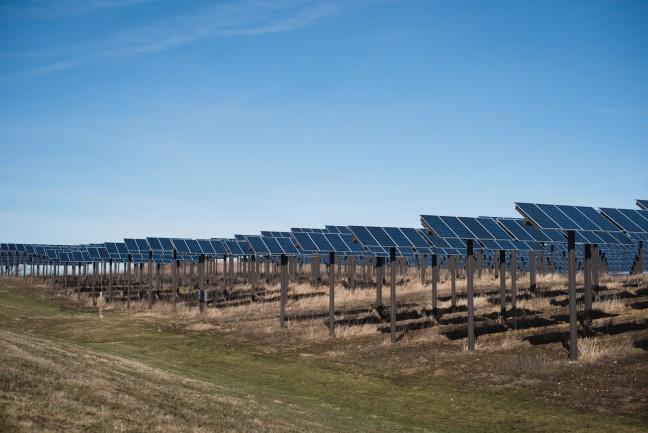In a push forward for renewable energy, Wisconsin regulators are building a $433 million solar park in Kenosha County, which is expected to be operating by 2023. Once the solar park is completed, We Energies, Madison Gas and Electric and Wisconsin Public Service will be in charge of operating the park and distributing power. The plant is predicted to power around 60,000 homes to the Kenosha area.
Renewable energy and saving the environment have been large topics of discussion in the political sphere for the past 10 years. During the 2020 presidential election, Joe Biden promised to rejoin the Paris Climate Agreement and reach net-zero carbon emissions by the year 2050.
In the state of Wisconsin, Gov. Tony Evers proposed a $91 billion state budget in February of 2021 to help reduce the effects of climate change. From this budget, $100 million were set aside for the research and development of clean energy sources. In his proposal, Evers stated his desire for Wisconsin to be carbon neutral by the year 2050.
Thus, the construction of the Kenosha power plant is a plausible extension of Evers’ clean energy agenda. Some groups, however, maintain reservations about the development for a variety of reasons.
Letter to the Editor: UW must pay student employees living wage
At another solar farm development in the Town of Paris, residents argue the development is not legal as it depends on leases that are not viable under the Wisconsin State Constitution. The development company behind the Dane County solar farm currently under scrutiny, Invenergy, is the same one that will build the Kenosha County solar farm. If this threatened lawsuit is brought upon the Dane County farm, it could affect the land leases for the Paris development as well.
Another concern residents have with the development is the decrease in property value that will result from having a home next to a solar farm. Though developers of solar power plants in Iowa claimed the farms would not affect property values, Iowans found their homes greatly decreasing in value after the farm was in operation. The Paris town chairman voiced his concerns about the development, namely that the solar farm would reduce the natural beauty of the land and possibly affect nearby roads, both of which contribute to this trend in decreased property values.
Residents are concerned about the cost and reliability of solar energy as well. The investment into the project is a large one, and taxpayers are wary of how that cost might fall upon them in addition to the worry that the plants will not be effective enough.
With the development of these new solar farms, We Energies and Wisconsin Public Service will retire and decommission 1,600 megawatts of fossil fuel plants. Additionally, residents fear the state did not do enough research into the efficiency and cost-effectiveness of solar power in comparison to other renewable energy sources. Groups such as the Wisconsin’s Citizens Utility Board are fearful of the reduction in fossil fuel power, in addition to the potential costliness and inefficiency of solar power.
Alden Global Capital’s bid for Lee Enterprises suppresses local journalism and democracy
Despite residents’ concerns, the Kenosha solar project is worth the investment. Switching to greener, cleaner sources of energy needs to happen in the United States if the effects of climate change are to be reduced. Implementing specialized, renewable energy plans on the state level may be more achievable than on the national level because they can be more adaptable to local needs. Because of this, smaller clean energy developments may play a big role in meeting national climate goals.
Additionally, there are many advantages associated with the use of solar energy. In regards to economic benefits, solar energy costs about three to six cents per kilowatt-hour in comparison to fossil fuels, which cost about five to 17 cents per kilowatt-hour.
Though there is a perception of solar power and solar farms as being unreliable, they are not any less reliable than fossil fuels. Solar panels collect energy into batteries to generate power even when the sun is not out. Moreover, solar panels tend to have a failure rate of only 0.05%.
But the most important impact of solar power is that it is a renewable energy source with concrete plans for implementation. Political discourse is not enough to reduce the consequences of climate change. Lawmakers’ promises to reach net-zero carbon emissions by the year 2050 are not realistic if renewable energy and clean sources of power are not implemented as soon as possible.
Letter to the Editor: Vote yes on referendum for livable UW student employee wages
There are ways in which the state of Wisconsin can make the transition for residents easier. Primarily, keeping citizens up to date on the development is incredibly important. With the construction of the Iowa solar farm, residents were not informed about the process at all and were shocked when they discovered how large the solar farm actually was.
As a result, the project was not well received and many neighbors complained that their houses were surrounded by solar panels and found their property values plummeting. If the government and Invenergy were to keep nearby residents up to date, it could help them ease them into the construction process.
The government could also create informational resources explaining the benefits of solar energy to community members to inform them of the benefits that solar energy could provide.
In order to ensure successful implementation of the project, it is imperative the government eases Wisconsinites into the idea of expanding solar energy. If the past developments are any indication of the future, there will likely be many new solar farms being built across Wisconsin over the next few years. Though residents might find it difficult to reconcile the new development with their concerns about the project, it is a necessary change to reduce the impacts of climate change before it’s too late.
Emily Otten ([email protected]) is a sophomore majoring in international relations and journalism.





















